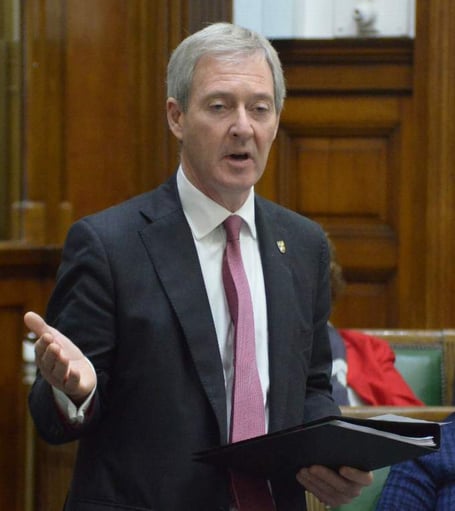CARE services in Surrey face being cut unless the Government releases more money for adult social care, Surrey County Council leader warned MPs yesterday.
Councillor Tim Oliver was giving evidence at the Housing Communities and Local Government (HCLG) select committee on Monday (October 25), which held its first session of an inquiry into how adult social care should be funded long-term.
The Government’s health and social care plan last month set out plans for a 1.25 per cent rise in National Insurance, with £5.4billion to go to social care in England over three years.
Conservative Cllr Oliver said the money is nowhere near enough and there are no more savings that the county council can safely make.
He said it would not even deal with current pressures, and that is before considering the proposed reforms – subsidising the cap on what users have to contribute themselves, the extra costs of means testing service users, and equalising what councils and individuals pay for care.
Cllr Oliver, who also chairs the County Councils network (CCN) which represents England’s county councils, said in the committee: “None of that £5.4will support the current pressures under the current system.
“The work that the CCN has done shows that just to stand still, in terms of delivering current care, between now and 2030 will be an extra £7bn nationally.
“Just to equalise care, to fund the fair price for care, will be about £750m a year as well.”
Stephen Chandler, Oxfordshire County Council’s director of adult social care, was in complete agreement, and said: “£5.4bn seems very small given the commitments against it.
“The plan does not address the here and now problems.”
He said a further £9bn a year would be needed to sustain the service and be able to pay care staff £11.50 an hour.
The county council spends around £365m on adult social care out of its £1bn annual budget.
Cllr Oliver said: “Either we have to reduce the service we’re offering to residents or we have to find some additional source of money.
“And that ignores the increase in costs and the changing demographic. So long-term sustainable funding is absolutely key to the survival of top-tier authorities.”
Council tax rises not seen as a credible answer
Both witnesses dismissed raising council tax, and the precept ringfenced for adult social care, as a possible solution.
Cllr Oliver said: “The problem is the differential amount that it raises across the country.”
A one per cent rise in Surrey would raise £7,500,000 while the same in Stoke-on-Trent would raise just £700,000.
Mr Chandler said: “Can anybody foresee an increase in council tax of 15, 16 per cent? I personally as a resident would baulk at receiving that through the post.
“Especially when at the end of that month in April I see the [health and social care] levy coming out of my salary.
“We also know that just because that power exists doesn’t mean that politicians in local areas are able to do that. We know last year 67 per cent of councils took up the full precept option.”
‘There are no more efficiencies to make’
Ian Byrne, Labour MP for Liverpool West Derby, said: “As well as through council tax and social care precept, the Government’s plan said it expects existing pressures to be met by long-term efficiencies. That sounds like austerity to me.”
Cllr Oliver said: “There isn’t any council at any tier in the country that hasn’t had to look for savings and efficiencies over the last 10 years or so.
“I look at my own council and many of my member councils and there is no obvious place for any of us to go.
“In terms of frontline services, there are just no savings that can be delivered safely.”
Mr Chandler agreed: “34 per cent of directors reported last year councils had to draw upon reserves in order to address adult social care overspends.
“In a sector that’s seen £8bn of savings needed over the last 10 years, there is only so much that can be done.”
A fair cost of care could ‘destabilise the market’
In Surrey, the average price for a residential care bed when funded by the council is £750 a week. But someone funding their own care pays £1,300 for the same thing, so self-funders are propping up the care home system.
The Government’s plan intends to equalise the cost of care by bringing the cost of all care down to the level a council pays, but Cllr Oliver said by doing this “you will destabilise the market”.
If on the other hand it is not reduced, the council will have to foot a hefty bill, because under the plan people will only be required to pay for the full cost of their own care if they have assets worth more than £100,000 – up from the current threshold of £23,250.
This is a particularly big problem in Surrey because of its high proportion of self-funders – 81 per cent of people accessing adult social care in the county pay for their own care.
Pressures on social care adds to pressure on NHS
Delays in discharging older patients from hospital is placing a big unnecessary demand on beds.
The Government has provided funding via the NHS since September 2020 to help cover the cost of recovery after discharge and enable social care assessments to be delivered outside of acute hospitals.
This was initially for up to six weeks. Now it is for four weeks, and Surrey’s adult social care director Simon White told the adults select committee last week: “We’ve been strongly advised that this scheme’s going to come to an end in March next year.
“What are we going to do from the 1st of April? Most of us are reluctant to return to the status quo where we will be assessing people’s long-term needs while they’re in a hospital bed.
“But if we are going to create an alternative it will need to be resourced and the signals from the Treasury is that there won’t be additional money coming from the centre.”
Cllr Oliver told the HCLG committee this ‘discharge to assess’ funding needs to continue.
He said the pressures in the NHS would not be addressed without addressing pressures in social care.
“The two are absolutely interlinked,” he said.





Comments
This article has no comments yet. Be the first to leave a comment.